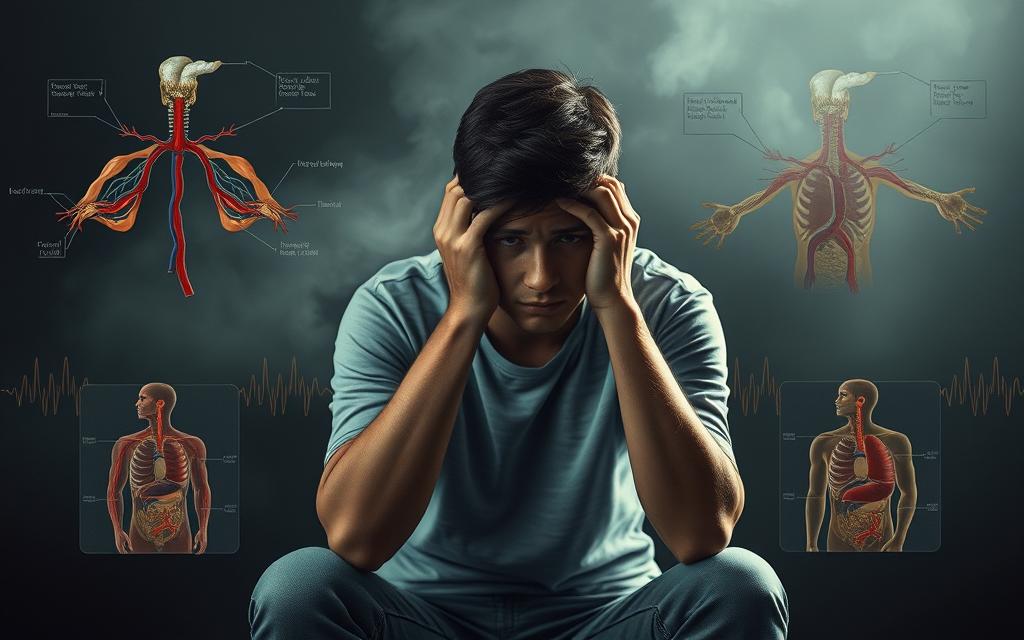Nicotine and Erectile Dysfunction Recovery: Effective Solutions for Young Men
The use of nicotine products, including vaping devices, has been linked to an increased risk of erectile dysfunction (ED), a condition that affects a man’s ability to achieve or maintain an erection. Research indicates that nicotine can constrict blood vessels, potentially leading to ED. A 2022 study found that e-cigarette users were 2.4 times more likely to report ED than non-users.
Quitting nicotine products is a crucial step towards erectile dysfunction recovery. For young men, this can significantly improve ED symptoms. Additionally, lifestyle changes and certain medications, such as sildenafil and tadalafil, can be effective treatments. Supplements like Nitric Recover also aim to boost male sexual performance by improving blood flow.
The Link Between Nicotine and Erectile Dysfunction
Nicotine, a highly addictive substance found in tobacco products and e-cigarettes, has been linked to an increased risk of erectile dysfunction. The physiological effects of nicotine on the body are multifaceted, impacting both vascular health and hormonal balance, which are critical components of erectile function.
How Nicotine Affects Blood Flow and Vascular Health
Nicotine’s impact on vascular health is significant, as it can cause blood vessels to constrict, reducing blood flow to the penis and making it difficult to achieve or maintain an erection. Quitting nicotine can help restore normal blood flow and improve overall vascular health. Furthermore, nicotine damages the endothelial lining of blood vessels, impairing their ability to relax and dilate properly.
The reduction in blood flow is not immediate but rather a result of prolonged nicotine use. As vascular health deteriorates, the risk of erectile dysfunction increases. Therefore, maintaining good vascular health is crucial for preventing erectile dysfunction.
Nicotine’s Impact on Hormonal Balance and Testosterone
Nicotine also disrupts hormonal balance, particularly testosterone levels, which play a vital role in sexual health. Testosterone is essential for libido and erectile function. Nicotine can lower testosterone levels by affecting the hypothalamic-pituitary-gonadal axis, leading to decreased sexual desire and erectile dysfunction.
Restoring hormonal balance after quitting nicotine can take time, and it’s essential to be patient and consider professional help if hormonal imbalances persist. A healthy lifestyle, including a balanced diet and regular exercise, can also support hormonal recovery.
Why Young Men Are Particularly Vulnerable
The increasing prevalence of nicotine products among young adults has raised concerns about their sexual health. Young men, in particular, are at a heightened risk due to various factors, including the rising trend of vaping and nicotine product usage.
This trend is alarming, with studies indicating a significant surge in nicotine consumption among young adults. The reasons behind this surge are multifaceted, including the availability of flavored products and the perception of these products as safer alternatives to traditional tobacco.
Rising Vaping and Nicotine Product Usage Among Young Adults
The vaping epidemic has seen a considerable increase in nicotine product usage among young adults.  This rise is attributed to various factors, including aggressive marketing and the availability of diverse flavors, making these products more appealing to younger demographics.
This rise is attributed to various factors, including aggressive marketing and the availability of diverse flavors, making these products more appealing to younger demographics.
Early Warning Signs of Nicotine-Induced ED
Young men should be aware of the early warning signs of nicotine-induced erectile dysfunction, which can include decreased libido, difficulty achieving or maintaining an erection, and overall decreased sexual satisfaction. Recognizing these signs early can be crucial in addressing the issue promptly.
Being informed about the risks associated with nicotine use and its impact on sexual health is the first step towards mitigating these risks. Young men can take proactive steps to protect their health by understanding the potential consequences of nicotine consumption.
Nicotine Erectile Dysfunction Recovery: The Path Forward
Understanding the recovery process is crucial for young men dealing with nicotine-related erectile dysfunction. Quitting nicotine is the first significant step towards regaining erectile health.
The journey to full recovery involves understanding the timeline for improvement, setting realistic expectations, and drawing motivation from success stories.
Timeline for Improvement After Quitting Nicotine
After quitting nicotine, the body begins to heal, and improvements in erectile function can be observed over time.
The timeline for improvement varies among individuals, depending on factors such as the duration of nicotine use and overall health.
Generally, noticeable improvements can occur within a few weeks to a few months after cessation.
Setting Realistic Expectations for Recovery
It’s essential to set realistic expectations for recovery.
Recovery is a gradual process that requires patience and persistence.
Understanding that setbacks can occur but don’t define the overall journey is crucial for maintaining motivation.
Success Stories and Recovery Statistics
Numerous success stories and recovery statistics provide hope and motivation for those on the path to recovery.
Studies have shown that a significant percentage of men experience improved erectile function after quitting nicotine.
For instance, a study found that men who quit smoking (a major source of nicotine) had a significant improvement in erectile function within a year.
Lifestyle Modifications for Faster Recovery
Making targeted lifestyle adjustments is essential for young men seeking to overcome erectile dysfunction linked to nicotine use. By incorporating specific changes into daily routines, individuals can potentially accelerate their recovery and improve overall vascular health.
Exercise Regimens That Improve Erectile Function
Regular physical activity is a crucial component of recovery. Exercise improves blood flow and enhances vascular health, which can help mitigate the effects of nicotine-induced erectile dysfunction. Some beneficial exercises include:
- Aerobic exercises such as running or cycling
- Strength training to improve overall muscle tone
- Pelvic floor exercises, like Kegel exercises, to strengthen the muscles involved in erection
For more information on how specific lifestyle changes can impact erectile dysfunction, you can visit Colorado Urologists to explore related topics.
Nutrition and Dietary Changes for Vascular Health
A balanced diet rich in antioxidants, omega-3 fatty acids, and fiber can significantly contribute to vascular health. Foods that are beneficial include:
- Leafy greens like spinach and kale
- Fatty fish such as salmon
- Nuts and seeds, particularly those high in omega-3 fatty acids
It’s also important to limit or avoid foods that can negatively impact vascular health, such as processed meats and foods high in saturated fats.

Stress Management and Sleep Optimization
Effective stress management is critical for overall health and can positively impact erectile function. Techniques such as meditation, yoga, and deep breathing exercises can help reduce stress levels. Additionally, prioritizing sleep and maintaining a consistent sleep schedule can further support recovery.
By addressing these lifestyle factors, young men can create a supportive environment that fosters recovery from nicotine-induced erectile dysfunction.
Psychological Aspects and Support Systems
While nicotine cessation is a critical step in recovering from erectile dysfunction, it’s equally important to tackle the psychological barriers that can hinder the recovery process. The psychological impact of nicotine on erectile function is multifaceted, involving factors such as performance anxiety and relationship dynamics.
Addressing Performance Anxiety During Recovery
Performance anxiety is a common challenge men face during recovery from nicotine-induced ED. It’s essential to recognize that this anxiety is a normal part of the recovery process. Techniques such as mindfulness, relaxation exercises, and cognitive-behavioral therapy can help manage performance anxiety. By addressing these concerns, men can improve not only their erectile function but also their overall well-being.
Partner Communication and Support
Effective partner communication is vital for recovery. Openly discussing feelings, concerns, and expectations can strengthen the relationship and provide emotional support. A supportive partner can significantly enhance the recovery experience.
Building a Supportive Environment
Creating a supportive environment involves both partners being understanding and patient. This can include educating oneself about ED, being open to communication, and fostering a positive and encouraging atmosphere.
When to Seek Couples Counseling
If communication challenges persist or if ED continues to strain the relationship, seeking couples counseling can be beneficial. Professional guidance can help navigate these issues, promoting a healthier and more supportive partnership.
Nicotine Erectile Dysfunction Recovery: Taking the First Step
Recovery from nicotine-induced erectile dysfunction is a multifaceted process that involves quitting nicotine, adopting lifestyle modifications, and leveraging support systems. By understanding the link between nicotine and erectile dysfunction, young men can take proactive steps towards regaining their sexual health.
Quitting nicotine is the first crucial step towards nicotine erectile dysfunction recovery. This, combined with lifestyle modifications such as regular exercise, a balanced diet, and stress management, can significantly improve erectile function. Support from partners, healthcare professionals, and support groups can also play a vital role in the recovery process.
By making informed choices and seeking the right support, individuals can overcome nicotine-induced erectile dysfunction and achieve a healthier, more balanced lifestyle. Focusing on overall well-being, including sexual health, is essential for long-term recovery and improved quality of life.
